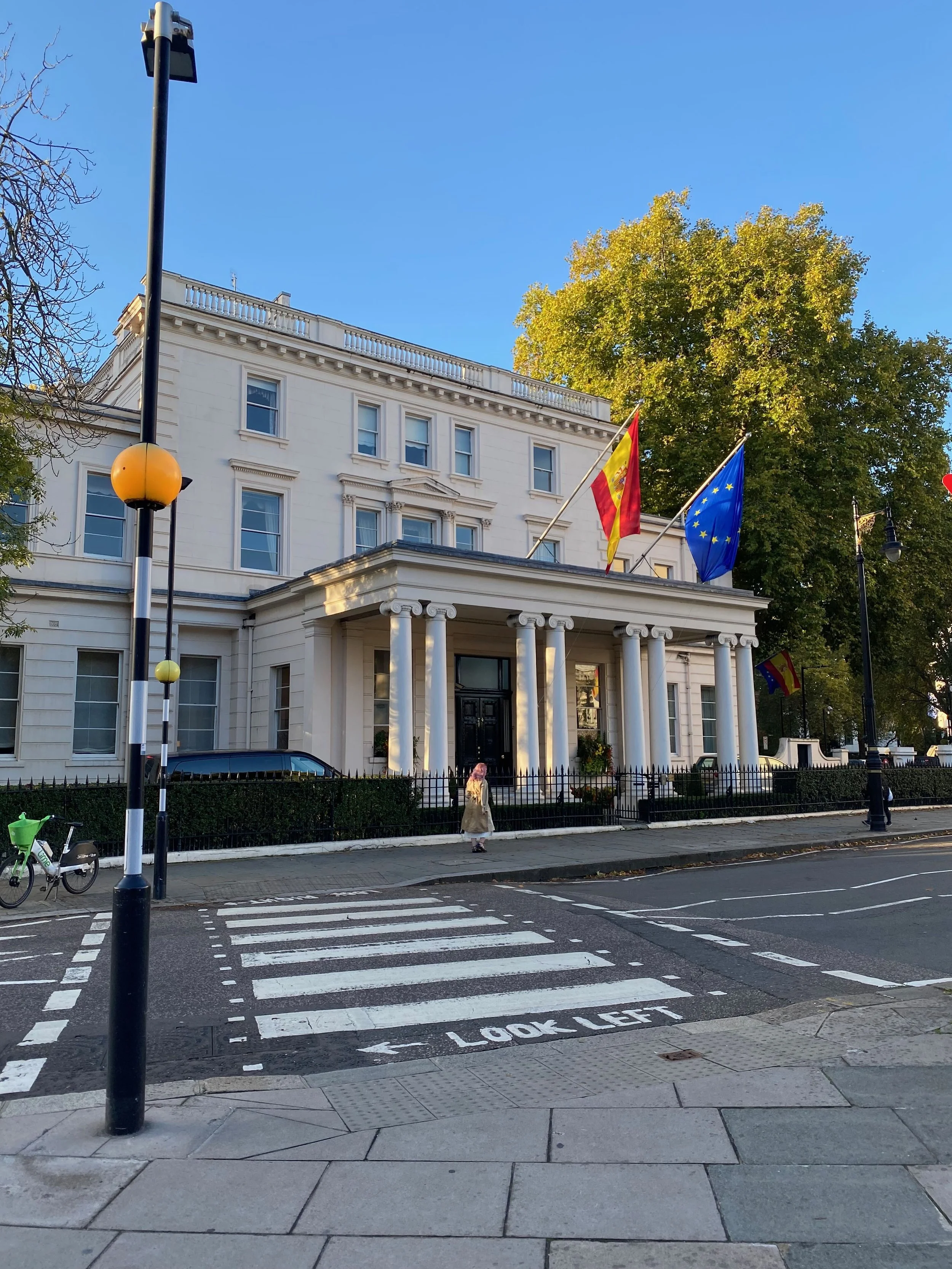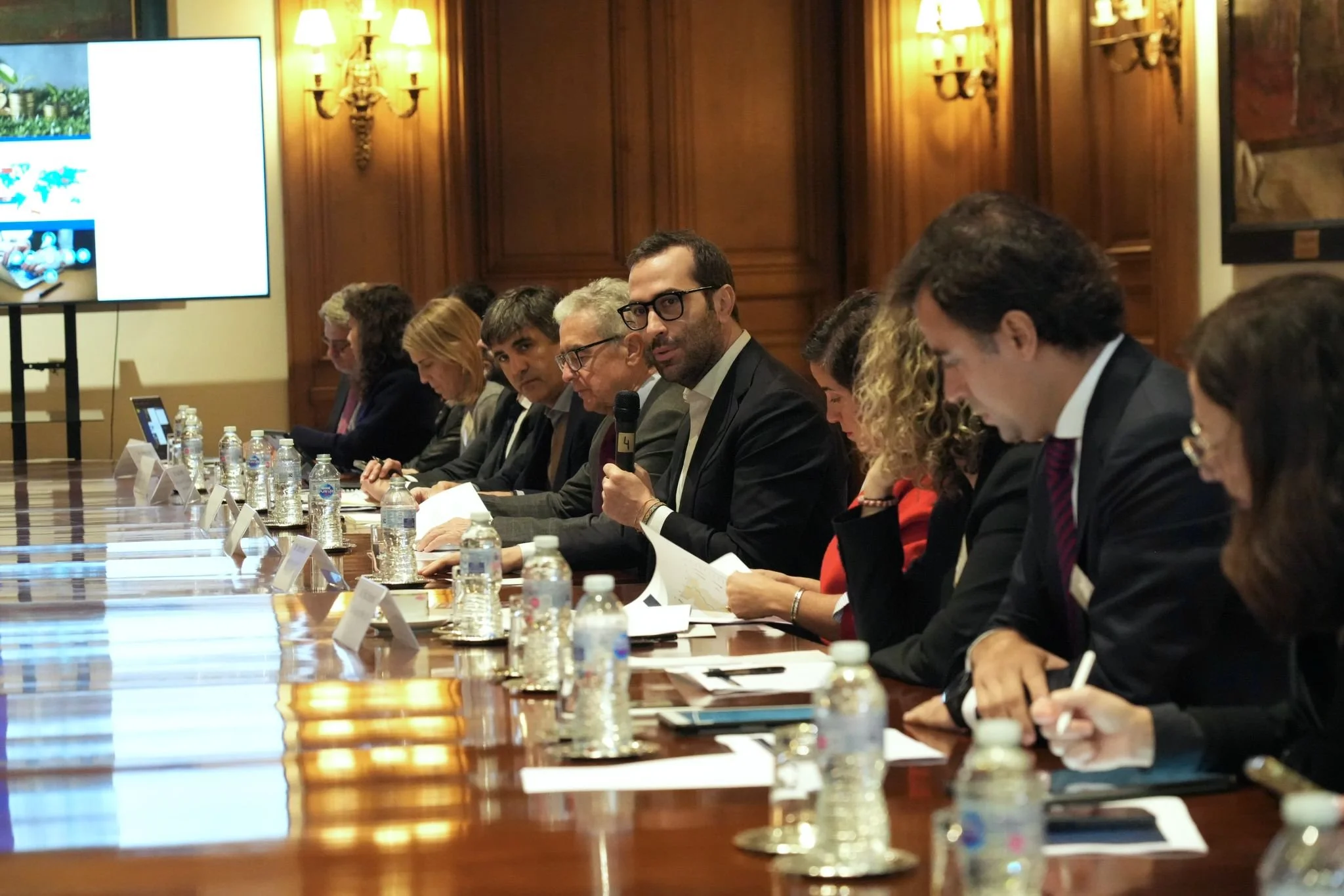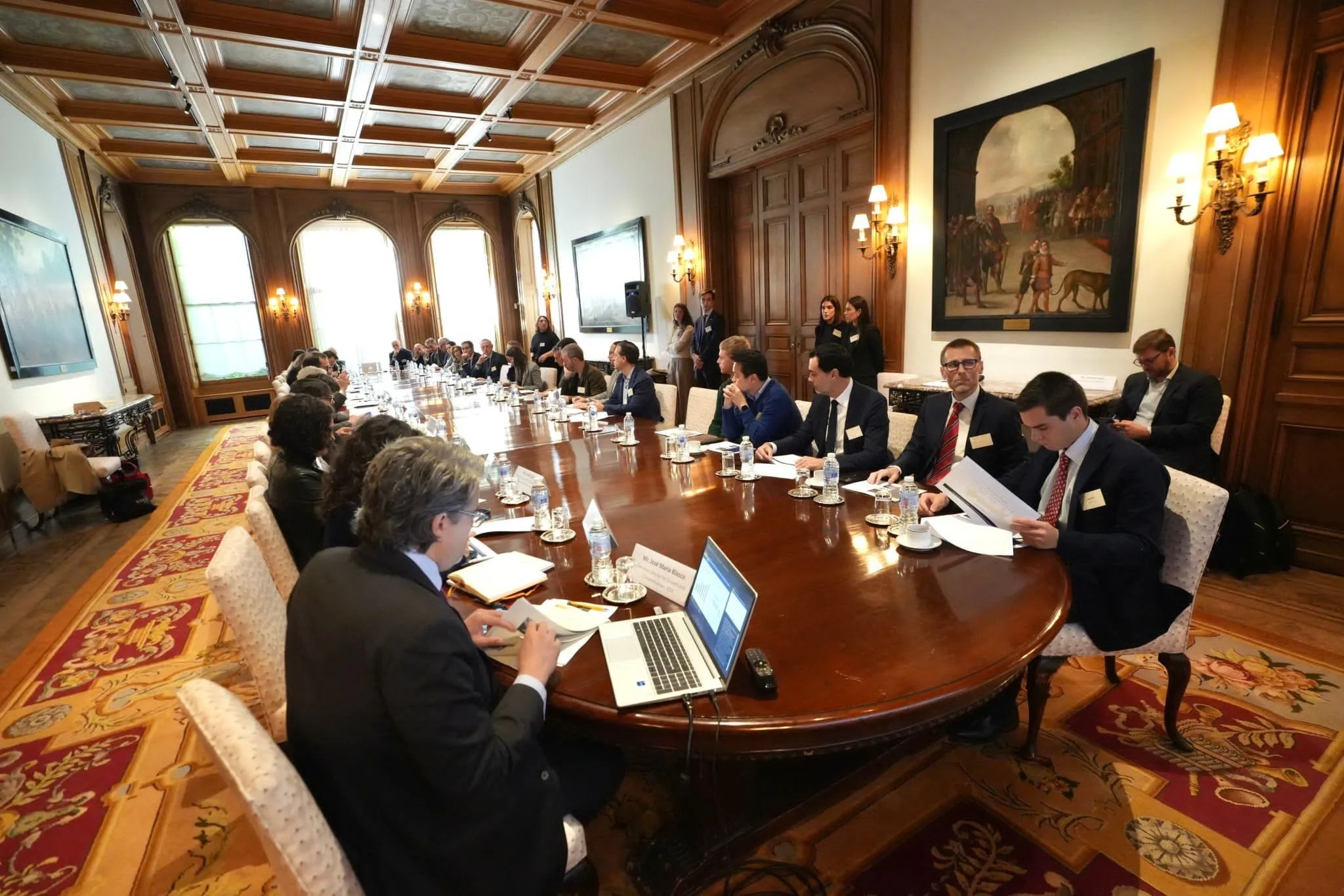Spain’s Rise: Innovation, Reputation, and Global Perception
Last Friday, I attended a private roundtable at the Spanish Embassy in London with Carlos Cuerpo, Spain’s Minister for Economy, Trade and Business, joined by his investment team from Madrid and London, as well as a cross-section of investors, venture capital funds, founders and advisers.
Since leaving UK Government it has been a privilege to engage with partner countries and support where that is needed, with either strategic advisory, communciations and positioning or international stakeholder engagement.
The session at The Spanish Ambasador’s Residence wasn’t just a briefing. It was an example of how a country can intentionally reposition itself and reshape its reputation, and, in doing so, build alliances, attract capital, and secure its place in the growing global innovation economy. The event was the culmination of an extended visit to London, where Cuerpo met with his UK Government counterpart Peter Kyle as well as with the UK Chancellor of the Exchequer Rachel Reeves.
For too long, Spain has been viewed through a narrow lens, as a tourism-led economy known for ‘quality of life, cultural exports, and sunshine.’ Those strengths remain, but are now being leveraged to rebrand Spain and its competitive offer to the world.
The fact is that the Spain that I grew up in and see today is one that has plenty of capital. In the past, this was just not seen. Today, with a range of companies ranging from infrastructure to telecommunications and fashion, Spanish capital is seen and investing in innovation and growth opportunities. As Carlos Cuerpo made clear at the embassy, Spain is now staking its claim as a serious innovation and investment hub, rooted in economic resilience, technological ambition and international credibility.
“Despite being the most affected country by COVID,” the Minister said, “we’ve now recovered the pre-COVID trend. It’s a great sign of how dynamic the Spanish economy is.” And the data backs it up and is being used to reset the narrative from Spain being there for tourism to one where it is there for investment and growth.
Minister Carlos Cuerpo leading the meeting.
A new economic story is being written
Data shows that Spain is outpacing the EU average with growth that, in the Minister’s words, is “twice as much as the EU,” is forecasting over the coming year, with a projected IMF growth rate for 2025 of 2.9%, according to the International Monetary Fund (IMF), October 2025 World Economic Outlook. Not bad.
According to data presented:
Over half a million new jobs are being created annually, “more stable, higher-value jobs,” many in sectors such as advanced engineering, digital services, and life sciences.
Labour market participation is now 30% higher than before COVID, and real wages have grown despite global inflation pressures.
Spain is today Europe’s third-largest start-up and scale-up ecosystem, with €5.7 billion invested in 2025, up 36% year-on-year.
85% of Spanish tech investment rounds now involve international investors, a clear sign of market confidence and openness.
This transformation is attracting attention. In recent months, the IMF, The Financial Times, and The Economist have all pointed to Spain as a standout performer in Europe. Just last month, The Editorial Board of The Financial Times wrote an opinion piece stating that, ‘Spain has become Europe’s standout economy.’
Strategic in a multipolar world
What makes Spain’s repositioning so relevant today is the context in which it is happening.
As I’ve stated before, we are living in a growing, multipolar, reputation-driven world, where alliances are shifting, capital is mobile, and narratives are as important as numbers. Countries that can project credibility, openness, strategic clarity and can be agile and move at pace are more likely to secure investment, attract talent, and build influence. Look at Asian countries and the civil services of countries like Singapore.
Spain has understood that it is not just economic policies that matter, but also how these and the country are presented and, critically, perceived. A point that I made at the roundtable and then to the Minister.
And it’s not just reacting to global change; it is using the tools of policy, investment, and strategic communication to define its place not just in Europe, but beyond.
“We’ve grown with purpose,” Minister Cuerpo said. “That means growth that is inclusive, investment-led and stable.”
Investment: from quantity to quality
One of the clearest signals of this soft repositioning that I picked up is how Spain is attracting high-quality foreign direct investment in future-facing sectors.
At the event, Cuerpo said that, “Spain was ranked seventh globally for new investment projects between 2018 and 2024,” citing Financial Times FDI Markets data. “We were second only to the United States in attracting investment in digital and green sectors.”
This isn’t speculative capital. It’s increasingly strategic and long-term by those that are looking for international growth markets.
The Ministry’s senior adviser on investment policy shared that the Next Tech Fund has already committed €600 million this year alone, investing:
54% in digital transformation
20% in deep tech
The remaining 26% in infrastructure, renewables, and industrial resilience
Spain’s Start-Up Law (2022), ENISA funding, and the public-private ICO Next Tech programme are all working together to professionalise the ecosystem and de-risk early-stage innovation.
This joined-up approach is building confidence, with investors around the table stating they are scaling up their efforts and investments in Spain over the next two years. The market's dynamism, transparency, and ease of investing, features not necessarily true across all EU markets, are helping to make Spain stand out.
Beyond tourism: the perception pivot
Spain’s shift is about more than policy and numbers. It is a reputational shift, which now requires a national brand evolution to reflect and amplify the confidence, capability, and ambition that is fast growing internationally.
In the past, Spain’s international perception centred on lifestyle, tourism, and cost competitiveness. Those qualities remain assets, but they are no longer the only story, especially if you also consider the innovation happening in universities and the work of their tech transfer and spin-out teams.
From Madrid to Málaga, Bilbao to Barcelona, Spain is increasingly viewed as a hub for serious business, particularly in:
Quantum computing (Multiverse Computing)
Life sciences (Barcelona’s Biocat and Madrid’s health clusters)
AI and applied data science in Euskadi - The Basque Country
Green mobility and renewable infrastructure
One investor described it as “a generational shift in mindset, Spanish founders today don’t just want to build for Spain. They want to lead in Europe and scale globally.”
Another founder said that, “Spain now produces the kind of founders we didn’t see ten years ago.” They are internationally minded, ambitious, and building for longevity.”
Years ago, when I was based in the UAE, I remember learning of the infrastructure work that Spanish construction companies like Ferrovial and others were involved in in Qatar and Saudi Arabia. I raised this as a great example with a Spanish Senior Civil Servant at the round table, of the quiet work that Spain is achieving worldwide and he agreed and said about how “Spain has been that we have been involved in rebuilding around the world.”
Soft power meets hard economics
What we are currently seeing with Spain’s transformation also challenges the artificial divide between ‘soft power’ and ‘hard policy’.
Yes, its reputation for cultural richness, social cohesion, and quality of life has long been admired. But, what’s happening now is a fusion of this soft power and strategic positioning, which makes Spain more investable.
International talent wants to live and build in places that offer safety, belonging and creativity. Investors look for ecosystems with stable governance, transparency, and alignment with international standards. Spain now offers both.
In fact, one participant put it plainly: “People used to go to Spain for the lifestyle. Now they stay because the ecosystem works.” And when you look at that lifestyle and the weather and culture, well, look at California and it’s origins and look at what Spain is building. Could it create a European model of Silicon Valley? A lot is needed, but it’s not impossible that, certainly within the EU, Spain could position itself as its European counterpart.
The role of strategic communications in national competitiveness
For me and my work at the intersection of strategy, communications and investment, Spain’s case highlights something unique: how national competitiveness is becoming increasingly reputational, and how this intangible asset needs to be leveraged correctly, to deliver growth that can support every citizen.
GDP growth is vital, but, unless that growth is experienced by a majority of citizens, well, GDP growth won’t be enough.
Governments need to translate communications into tangible experiences. It needs to communicate what makes their economy different and the experiences that they delivery. They must build stakeholder trust, offer predictability, and present a vision that investors and partners believe in.
Carlos Cuerpo’s team focused on presenting a coherent, data-driven, and quietly confident story of transformation. Yes, questions and requests were still being made privately, but these questions were noted for internal discussion.
As for where Spain is now, their framing was clear:
Spain is open: 85% of funding rounds involve foreign investors.
Spain is mature: It now hosts over 15 unicorns and third- and fourth-time founders.
Spain is trusted: Its policies are seen as credible, transparent, and consistent.
What other countries can learn
Spain’s offers several lessons for nations and leaders navigating this complex geopolitical moment:
Narratives matter: Investment follows clarity. A country’s story must match its substance and be told with confidence and continuity.
Perception is a strategic asset: Reputation influences who shows up at the table, and whether they stay.
Soft power is not a luxury; it’s a multiplier: Spain’s culture, creativity and openness are now part of its economic proposition.
Build for partnerships, not just praise: Spain’s strength lies in how it brings together government, capital, universities, and corporates, and opens the door to international collaboration.
Spain’s future as a central figure in European innovation
The data doesn’t lie, and I hear that from my contacts in other markets across the GCC, Asia, and Southeast Asia. Spain is positioning itself and is being recognised as a pillar of the EU’s innovation agenda, particularly in strategic autonomy areas such as digital infrastructure, biotech, AI, and climate technology.
So, what comes next?
Spain will need to double down on scaling late-stage ventures to turn unicorns into global market leaders.
Continue building out its institutional capital base, including pension and sovereign fund participation in VC.
Extend its international communications footprint, ensuring that Madrid, London, Singapore, Abu Dhabi, Riyadh, New York, and Tokyo all understand the depth and direction of Spain’s growth model.
Spain is no longer just an economic recovery story; it’s a reputational success story
In a fragmented, multipolar world, countries like Spain that combine strategy, narrative and trust will lead the next wave of global growth.
Yes, Spain has changed, and not just in numbers, but in how it is seen. And that, ultimately, is what will shape and enhance its influence, its investment flows, and its future.








